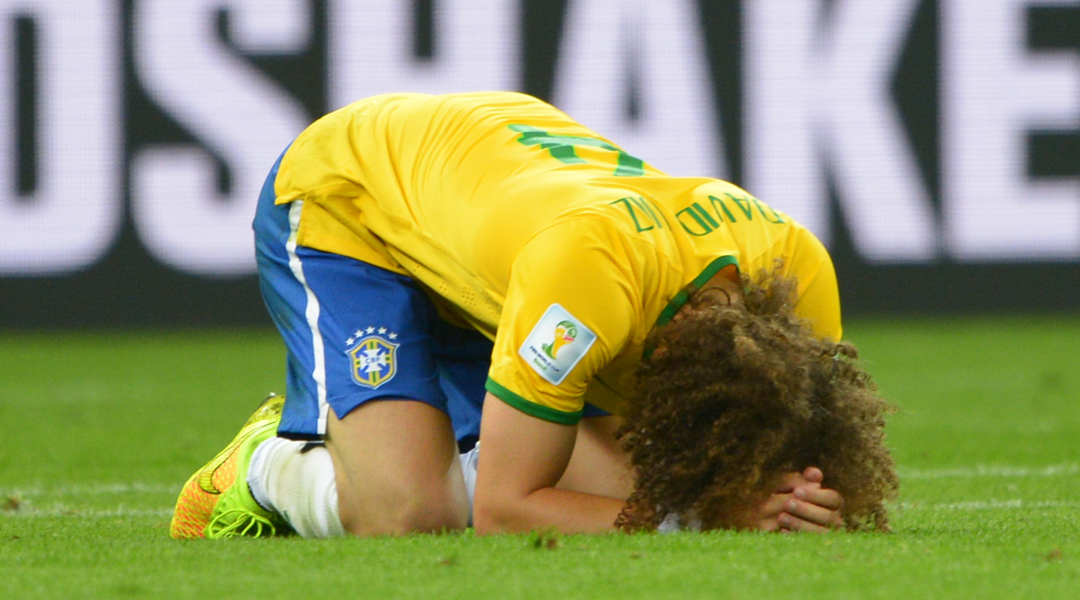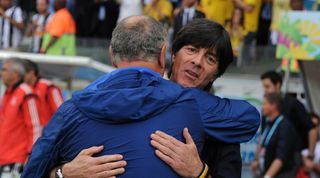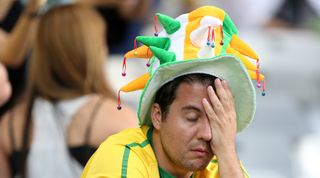Mineirazo is a sad comedy, not a Maracanazo tragedy – and Luiz is the least of Brazil's problems
FFT's man in Brazil Mauricio Savarese on what happens next after one of history's most stunning semi-final results...

The first half wasn’t even finished when the Brazilian crowd at the Mineirão stadium started their “oleee” to ironically cheer for Germany, but it was already 5-0 against the hosts. When Miroslav Klose, the new all-time World Cup top goalscorer, was substituted, everyone applauded. The predecessor, the Brazilian Ronaldo, was booed when he appeared on the screen. Seconds after Andre Schuerrle scored the seventh, the same round of applause appeared. Oscar’s consolation goal minutes before the final whistle was welcomed with chants of “I still believe” and laughter. The Mineirazo is nothing like the 1950 Maracanazo.
Humiliation? Yes. Tragedy? Not exactly. Few tears on the stands as the match ended; no riots on the streets, contrary to what was expected by those less keen on Brazilian people. Jeers for every Brazilian player, both in the stadium and outside, except for one who deserved some credit despite the big mistakes he made in the semi-final: David Luiz, PSG's new signing from Chelsea. But overall, Brazilian expectations were so low after conceding four goals in 10 minutes that the German players were actually more sorry for Brazil than the fans. Yes, the Germans actually said that - coach Joachim Loew and Toni Kroos.
Many Brazilians already believed that Germany were the favourites since the hosts couldn’t count on their two best players (injured Neymar and suspended Thiago Silva), but that reasoning would explain a narrow defeat: Seleção players could say it would have been different if their star were on the pitch. The German hammering has sparked such an angry reaction from those in the business that now they will pressure for changes in the Brazilian FA, in the coaching style, in the players' mentality and anything else that appears slightly Mineirazo over the next few years. In the hours since the game, massive attention has been paid to a movement started by players called Common Sense, designed to change Brazilian football for the better.

Brazil coach Luiz Felipe Scolari, who would leave at the end of the World Cup anyway, recognised Germany outclassed Brazil. Although apparently brave, he was actually being quite modest: a generation of Germans brought up by Loew beat a crop of Brazilians who have Scolari all over them. Not that he invented players like Luiz Gustavo and Hulk, but the inspiration from 2002 World Cup champion Big Phil has made clubs and agents crave for footballers like these: very physical, with good endurance, but few skills with the ball. No wonder why no Brazilian strikers, except for Neymar, have earned respect in Europe in the last few years.
Get FourFourTwo Newsletter
The best features, fun and footballing quizzes, straight to your inbox every week.
Brazil in the post-Scolari era
Although the coach will be gone, some of his men will remain. As Brazilians are very bipolar, they will say this team is full of players who should never play for the Seleção again, but that is far from true. The defensive duo of Thiago Silva and David Luiz will surely be kept, like left-back Marcelo. Neymar will surely continue as the squad's pivotal figure for the next few years - after all, he is just 22 and exempt from this shocking defeat. It wouldn’t be a surprise to see 34-year-old keeper Julio Cesar go on. Some others who weren't in the starting lineup will also be used in the future, as may the likes of Hernanes and Bernard. But this could be the end of the road for many who had a below-average tournament.
Striker Fred, the lowest scoring centre-forward Brazil have ever had in a World Cup starting lineup, is out. Barcelona right-back Dani Alves has been so bad he was replaced by elderly Maicon in the middle of the tournament. Fernandinho, Paulinho and Oscar will have to improve dramatically in the next few years if they want to come back to the team - Brazil will soon have Copa America and 2018 qualifiers.

Players that didn’t make to the cut, like Liverpool’s Philippe Coutinho and PSG’s Lucas Moura will probably be needed to reconstruct the team under a future coach very different from Scolari and his sidekick at this World Cup, Carlos Alberto Parreira.
Unlike the 1950 vintage, Brazil 2014 didn’t have enough talent to win. That is the main lesson for the hosts to learn. When Russia 2018 comes, many Brazilians would much rather be crying at a new tragedy than being the stooges in a new comedy creating laughter for the opposition.
